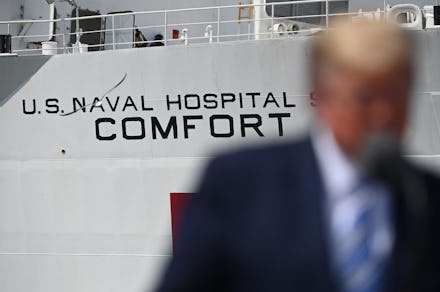Trump will use the Defense Production Act for all sorts of stuff — except coronavirus relief

When President Trump confirmed he was signing the nearly 70-year-old Defense Production Act in mid-March to address the coronavirus pandemic sweeping across America, he said he made the decision "just in case we need it." But despite clearing the way for the federal government to demand private companies put their manufacturing capacity toward building the much-needed ventilators, protective robes, and face masks that medical professionals have been pleading for since the pandemic began, the president has been decidedly cagey about actually ordering businesses to get to work. It wasn't until an awkward tweet about General Motors in late March, more than a week after he first signed the DPA, that he indicated he'd actually finally implemented the law to battle coronavirus.
Trump has framed his foot-dragging as a principled hope to use the act only as a "last resort," and he's additionally justified his delay by invoked the dreaded specter of socialism. "The fact that I signed it, it's in effect," Trump said in late March. "But you know, we're a country not based on nationalizing our business. Call a person over in Venezuela, ask them how did nationalization of their businesses work out? Not too well."
Putting aside the obvious red herring of Trump's offhanded Venezuela line, there's a bigger problem with the president claiming reluctance to actually use the DPA: He's done it before. A lot, actually.
According to a New York Times report released this week, the act "has been used to place hundreds of thousands of orders by President Trump and his administration to ensure the procurement of vital equipment." That equipment reportedly includes everything from military hardware and border security gear to equipment for natural disaster responders to use in the field.
"As recently as last summer," the Times reported, "the Department of Defense used [the DPA] to obtain rare earth metals needed to build lasers, jet engines, and armored vehicles." The law was also used to help obtain body armor for Customs and Border Protection officials. And while it's not outrageous in and of itself for something called the Defense Production Act to be used for things like weapons and flak jackets — items that easily fall under the heading of "defense" — the fact that the act could be, but largely hasn't been used to literally save lives is hard to understand.
Per the Times:
The Defense Department estimates that it has used the law’s powers 300,000 times a year. The Department of Homeland Security — including its subsidiary, FEMA — placed more than 1,000 so-called rated orders in 2018, often for hurricane and other disaster response and recovery efforts, according to a report submitted to Congress in 2019 by a committee of federal agencies formed to plan for the effective use of the law.
And yet, despite the Trump administration's almost mind-bogglingly frequent usage of the DPA, the president's reluctance to actually put it into effect to help the government's coronavirus response is part of his broader, failed attempt to ride out the pandemic on the waves of the free market. Since invoking the act, the president has made a point to laud the private companies — including ones helmed by some of his most vocal supporters — who have voluntarily stepped up to manufacture ventilators and face masks, while states have pleaded with the administration for a more all-encompassing federal response.
“What’s more important? Building an aircraft carrier or a frigate using priority ratings, or saving a hundred thousand lives using priorities for ventilators?” Larry Hall, the former DPA program director for the Federal Emergency Management Agency, told the Times. By the president's logic, "most of our economy is already nationalized," Hall said. "But it isn’t."